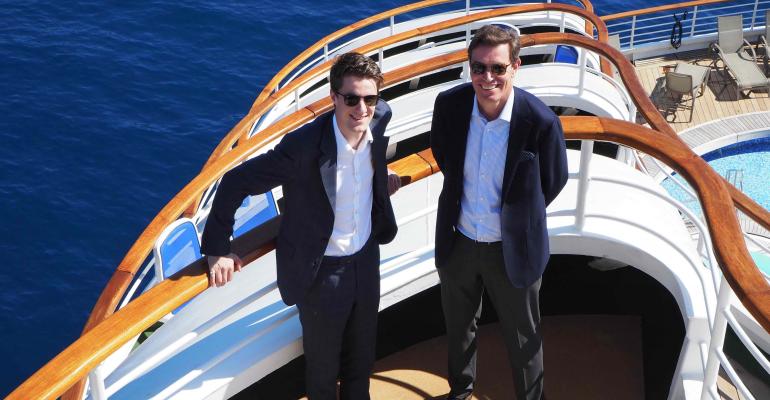Opportunity to future-proof
'COVID-19 is the No. 1 thing now but it's going away sooner or later. This is an opportunity to take steps to future-proof the industry with proper sustainable practices,' urged Per Bjornsen, director, V.Ships Leisure.
People want to cruise, added his colleague, Alex Iley, business development manager. But more and more, consumers are choosing products and services that reflect their values. When it comes to discretionary travel, there's a wide range of choices.
'However unfair, everyone is bashing cruise ships for COVID,' Iley said, 'but the next thing will be sustainability.'
Public perception
Social responsibility in every aspect of operations isn't just the right thing to do, it's also key to how the public perceives cruising.
The offshore aspect of the business makes it a target for criticism. Witness the backlash in the US about cruise lines and COVID-19 financial relief.
Before the virus, environmental and overtourism concerns were emerging at some destinations. If cruise lines don't take the most responsible approach, communities may ask why should we welcome these ships? The current pause gives a chance to turn that around, Bjornsen said.
Working toward carbon neutrality is very meaningful, especially to younger travelers, Iley pointed out. And, as lines strive to make cruising safer from a public health standpoint, this is a juncture to look at matters like air recirculation, the role of design in sanitation and how to influence behavior to foster a healthier shipboard environment.
'We love this industry and the people,' Bjornsen said. 'There's a huge opportunity for the industry to do [sustainability] well because lines fully control what happens on their ships.' And the cruise business touches everything — destinations, fuel, food — so there's a chance to influence many areas.
Competitive advantage
'Sustainability has to be built into everything you do,' he continued. 'Those cruise lines that get it right will be at a competitive advantage. They'll get better financing and people will want to travel with them.
'As a leader in our sector, we put this on the agenda and support our clients in their business strategy. We make sure sustainability is on the agenda. We work closely with our clients in implementing it.'
That said, this really needs to be a whole-industry goal, Bjornsen stressed, and companies should share best practices, as with Cruise Lines International Association fostering a framework to address COVID-19.
Positive impact on air travel — cruising can take it further
COVID-19's impact on flying is going to make airplane travel safer and more comfortable, with cleaner planes and airports. While the cruise industry has always been way far ahead of air travel in this respect, it can do even more now.
HVAC
For example, though recycling air is more efficient, the current health situation forces a close look at HVAC technology and solutions.
Ship design/materials
The way airplane seats are currently designed, they can't be easily cleaned. Cruise ship designers, Iley proposed, can offer designs that optimize stateroom sanitation. Perhaps materials like copper that inactivate viruses and bacteria could be incorporated.
'Nudge' theory
How to facilitate social distancing on a cruise — by nature a social activity — is challenging and another area for new thinking. Besides reducing occupancy, traffic flow on board is being examined, along with service — self-service in buffets and other areas is likely to go away.
Iley said the 'nudge' theory of design, which subtly seeks to alter consumer behavior in a positive way, could help reduce crowding and encourage distancing by, for instance, using different flooring materials to hint where people might stand or queue.
Technology
Devices like Carnival Corp.'s OceanMedallion, in use at Princess Cruises, provide ample real-time data on consumer behavior and the ability to know where people are at all times. This and other types of wearable technology could be employed to ease traffic flow and reduce crowding. If people are collecting in one place, activities could be spread out.
Other technology solutions like thermal scanning may provide a discreet way to monitor health on board.
The crew ecosystem
'The whole ecosystem of the crew has to be thought out going forward,' Bjornsen added.
In short, everything that's happening now on the public health front also ought to be done with an eye to sustainability. This is a story, Bjornsen said, that cruise lines want to be able to tell their customers.
Copyright © 2024. All rights reserved. Seatrade, a trading name of Informa Markets (UK) Limited.
Add Seatrade Cruise News to your Google News feed.  |

